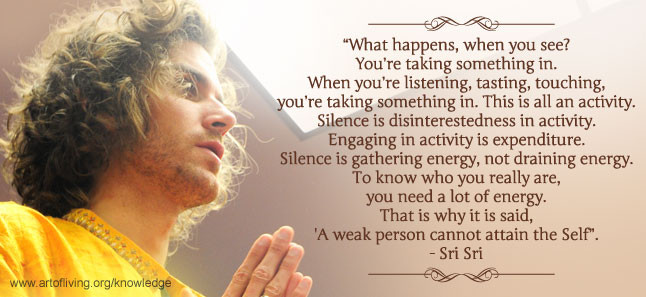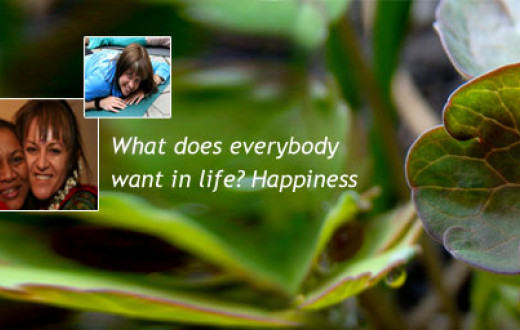
One is not saying anything. This is what we usually call silence. People understand silence as not talking, not gesturing, and not doing anything.
There is another level of silence which is one step further. It is when our mind is not interested in the things around it, but is just focused inward. You are not interested in seeing, talking or listening to anything.
What happens when you see? You’re taking something in. When you’re listening, you’re taking something in. When you’re tasting, and touching, you are talking something in. All our five senses are trained to take something in. This is all an activity. Silence is disinterestedness in activity.
This does not mean that you shouldn’t eat food. Eat food, but do not feel like, this food is tasty, this food is not tasty. Eat food but your mind must not be involved. The mind not getting involved in any of the five senses brings a certain amount of quietness inside you and this is the second type of silence. It is an inward journey of the mind.
Silence is disinterestedness in activity.
The mind not getting involved in any of the five senses brings a certain amount of quietness inside you. It is an inward journey of the mind.
The third degree of silence is, total oneness, total satisfaction. There is no need of anything, total contentment. It is when all your energies, the thoughts, the mind, which is scattered all over the place comes back to its source.
In some deep meditation you might have had the glimpse of that total stillness of the mind. And this stillness can be there even when you are active.
Now you might think, 'Why bother about meditation when sleep is good enough?' That is because when you are sleeping, even though your mind is not engaged in activity, there is another type of physical activity which is even more during sleep. When you’re sleeping your body is rejuvenating, it is growing, cells are multiplying; there is a lot of physical activity in the body. In fact, this sort of physical activity is much more in sleep than in the waking state.
In meditation, the reverse happens, the physical activity is low in the body. In sleep, the metabolism is high, but in meditation the metabolism comes down. So, the body also calms down and the mind also calms down during meditation.
Then what happens? The intelligence awakens. This is the result of meditation. That is why you become brighter and sharper (with the practice of meditation) because it rejuvenates the body and mind at the same time and so you feel energetic.
To know 'Who You Really Are' you need a lot of energy. Energy is what is essential.
To run an atomic reactor you need energy in order to create more energy, isn't it? In the same way, to tap the source of energy, you need energy.
In Sanskrit there is a saying from the Upanishad, ‘Nayam Atma Balaheenena Labhya’. A weak person cannot attain the Self.
Don’t think this means that you have to be strong physically, no! They are referring to weak in the energy sense. And how do you become weak? When you all the time engage in the five senses.
To know 'Who You Really Are' you need a lot of energy. Energy is what is essential. In Sanskrit there is a saying from the Upanishad, ‘Nayam Atma Balaheenena Labhya’. A weak person cannot attain the Self. And how do you become weak? When you all the time engage in the five senses.
If you sleep a lot, don’t you feel tired and weak? If you eat a lot, don’t you feel tired? You do feel tired, isn't it!
If you sit and watch soccer the whole day, how do you feel at the end of the day? Totally drained! People watch movies day after day. Everyday there is some TV serial, something thrilling, something exciting, and after watching and watching, you look so tired!
People who go for movies, you should click a picture of them when they get into a theatre and again when they come out of the theatre. You will see how tired and worn out they get.
If you go to conferences where people talk from morning to evening, and sometimes even at the dinner table, they get so worn out. Someone is giving a speech and hardly anyone is listening to them, only the one who gives the speech is satisfied that he gave a talk. That is all that happens. He waits for an opportunity to throw out whatever he has been thinking in his mind, but there are very few takers. People listen and they feel so exhausted and tired. This happens in many of the conferences. If they don’t leave that little space for a break, or music, if they don’t give people some time to sit and relax, they get worn out.
When you see many professors or intellectuals, do you see them smiling and having a vibrant energy? Seldom you will find it. They are all so tired and worn out. Listening too much also wears you out.
Usually people who give lectures, it takes 10-15 minutes for them to warm up, and then they start delivering. They talk for not less than an hour and a half. I only talk for 10-15 minutes, sometimes half an hour. That’s the maximum. No more. People cannot take it.
So, listening too much drains you, seeing too much drains you, eating drains you.
Just hang around with somebody, hold their hand, that also will definitely drain you. That's the reason why people get together and they move apart because they have not taken that much needed space for them self, or given that space to others. We must respect our own space and another’s space.
If you’re upset, angry, depressed, hateful, or jealous; any of these negative emotions, it simply means that you are lacking energy (prana), and you have moved away from the center.
This is a very simple equation: If you’re upset then you lack prana, that’s it. When energy is there, then there is no question of getting depressed or upset.
Once you’re centered (established in the self), once you’ve caught the essence, then it doesn’t matter. But even then there should be caution: not to do too much of anything. But till the time your system becomes strong enough to hold this enormous energy, these steps or these rules are very essential.
Silence is bringing you back home, and it gives you that much needed energy to realize 'Who You Are', to realize that there is bliss, there is beauty, there is joy, and that is 'You'.
If you’re upset, angry, depressed, hateful, or jealous; any of these negative emotions, it simply means that you are lacking energy (prana), and you have moved away from the center.
This is a very simple equation: If you’re upset then you lack prana, that’s it. When energy is there, then there is no question of getting depressed or upset. There is no question of saying, ‘Oh, everything is bad. The world is hopeless’.
When there is energy, it gives you enthusiasm, then you say, 'If the world is hopeless it gives me an opportunity to do something about it. Improve the world', because that energy uplifts your spirit and uplifts everybody’s spirit as well.
It is like making a home of sand. You make a home of sand 10 times and it collapses, but then the next minute you’re ready to make it again. You remain unmindful of whatever has happened before, that indicates prana.
(Click Here to continue reading)

























